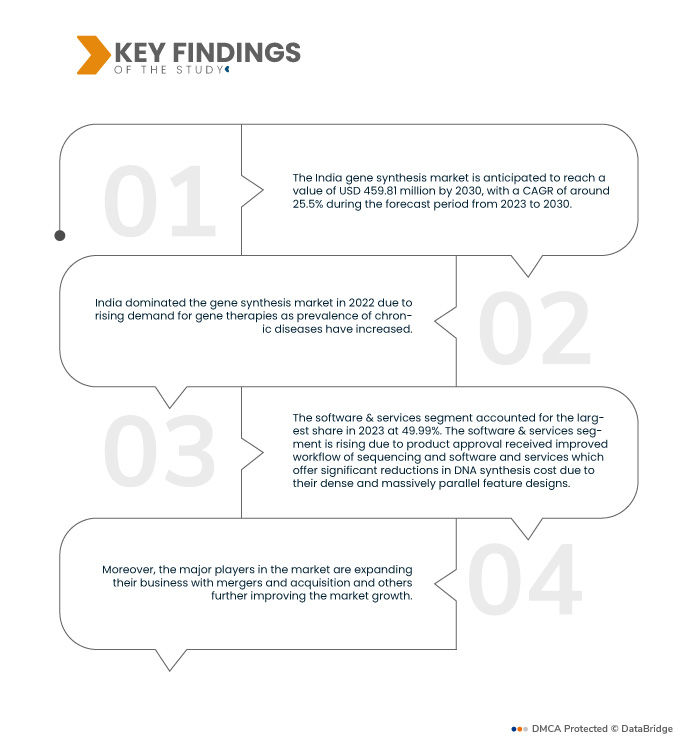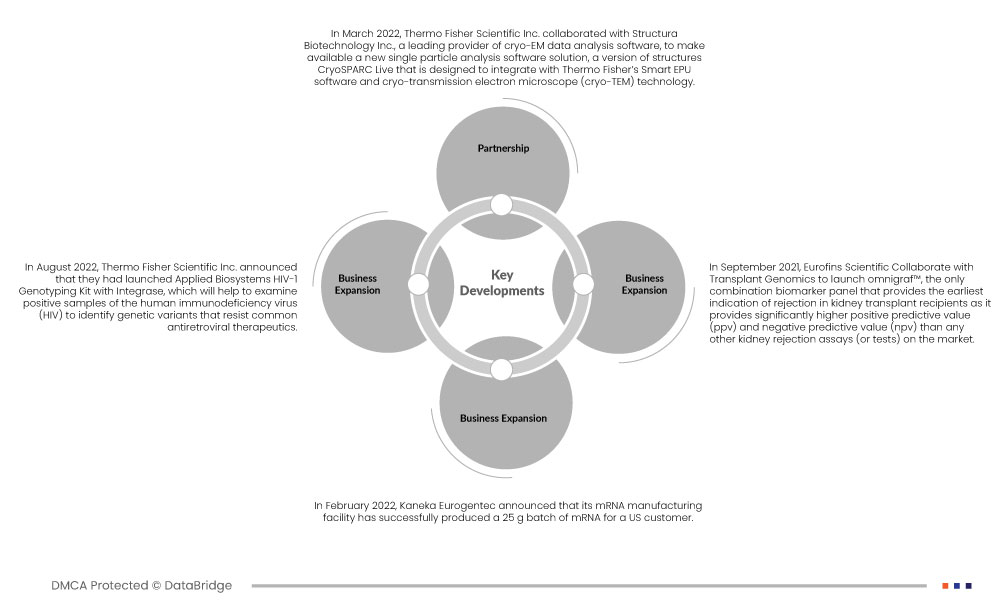遺伝子合成とは、DNA鎖の塩基ごとの化学合成を指します。細胞内または細胞外から起こるさまざまなDNA複製は、 ポリメラーゼ連鎖反応 (PCR) では、遺伝子合成にテンプレート鎖は必要ありません。むしろ、遺伝子合成では、一本鎖分子にヌクレオチドを段階的に追加し、それが相補鎖を作成するためのテンプレートとして機能します。遺伝子合成は、合成生物学の分野の基礎となる技術です。
完全なレポートにアクセスするには、https://www.databridgemarketresearch.com/reports/india-gene-synthesis-market
遺伝子合成の技術的進歩により、合成生物学研究は近代化されました。科学者は、一度に 1 つの遺伝子を操作する従来の方法に限定されなくなりました。科学者は、ゲノムと細胞全体を設計または再プログラムする力を持っています。新しく合成されたウイルスゲノムは、今後、ワクチン開発を促進し、がん細胞を排除し、持続可能なバイオ燃料を生産すると期待されています。土壌、空気、水中の環境汚染物質を検出して分解することができます。バイオテクノロジーと生命科学の研究者と多くの研究分野の学界は、新しく合成されたゲノムを使用して、ヘルスケア、農業、エネルギー、その他の人間の努力の分野の進歩を加速しています。
データブリッジマーケットリサーチの分析によると、 遺伝子合成市場 2023年から2030年の予測期間に25.5%のCAGRで成長し、2030年までに4億5,981万米ドルに達すると予想されています。このコンポーネントセグメントは、遺伝子治療の採用の増加、合成生物学の拡大、分子生物学の分野での遺伝子合成への関心の高まりにより、市場の成長を促進すると予測されています。
研究の主な結果
慢性感染症の蔓延
細菌性およびウイルス性疾患は、 感染症 その結果、このような致命的な病気と戦うための新しい効果的な治療法の需要が高まっています。これらの病気は化学薬品や 生物学的療法、 含む 遺伝子治療。
申請することで ゲノミクス、感染症や風土病の管理が強化されました。また、薬剤耐性の出現を理解し、新しい治療薬やワクチンのターゲットを特定することもできます。感染症の治療では、遺伝子治療が組み換えDNA技術、DNAおよびRNAリボザイム、単鎖抗体を使用して治療できるため、多くの研究者を魅了しています。病原体や個人の特定の遺伝的特徴に合わせた個別化治療、薬剤開発、ワクチン研究、診断の必要性が高まる中、遺伝子合成は極めて重要なツールになります。インドの医療システムと医療インフラが強化されるにつれて、研究開発とインフラへの投資は増加すると予想されます。 バイオテクノロジーこれらの疾患に取り組むために、この分野の転換が求められています。これにより、市場の成長が促進され、標的療法の開発、迅速なワクチン開発、正確な診断、慢性感染症に焦点を当てた徹底的な遺伝子研究への新たな道が開かれると期待されています。
レポートの範囲と市場セグメンテーション
|
レポートメトリック
|
詳細
|
|
予測期間
|
2023年から2030年
|
|
基準年
|
2022
|
|
歴史的な年
|
2021 (2015~2020年にカスタマイズ可能)
|
|
定量単位
|
売上高(百万米ドル)、販売数量(個数)、価格(米ドル)
|
|
対象セグメント
|
コンポーネント (合成装置、消耗品、ソフトウェアとサービス)、遺伝子タイプ (標準遺伝子、発現遺伝子、複合遺伝子、その他)、遺伝子合成タイプ (遺伝子ライブラリ合成とカスタム遺伝子合成)、アプリケーション (合成生物学、遺伝子工学、ワクチン設計、治療用抗体、その他)、方法 (PCR ベースの酵素合成、チップベースの DNA 合成、固体ベースの合成)、エンドユーザー (学術機関と研究機関、診断研究所、バイオテクノロジーと製薬会社、開発業務受託機関 (CRO)、農業、食品、その他)、流通チャネル (直接入札、オンライン配信、サードパーティ販売業者)
|
|
対象国
|
インド
|
|
対象となる市場プレーヤー
|
Thermo Fisher Scientific Inc.(米国)、Boster Biological Technology(米国)、Twist Bioscience(米国)、OriGene Technologies, Inc.(米国)、Eurofins Scientific(ルクセンブルク)、GenScript(米国)、Merck KGaA(ドイツ)、Kaneka Eurogentec SA(ベルギー)、Synbio Technologies(中国)、GCC Biotech (INDIA) Pvt. Ltd.(インド)など。
|
|
レポートで取り上げられているデータポイント
|
Data Bridge Market Research がまとめた市場レポートには、市場価値、成長率、セグメンテーション、地理的範囲、主要プレーヤーなどの市場シナリオに関する洞察に加えて、専門家による詳細な分析、患者の疫学、パイプライン分析、価格分析、規制の枠組みも含まれています。
|
セグメント分析:
インドの遺伝子合成市場は、コンポーネント、遺伝子タイプ、遺伝子合成タイプ、アプリケーション、方法、エンドユーザー、流通チャネルに基づいて分類されています。
- コンポーネントに基づいて、市場はシンセサイザー、消耗品、ソフトウェアとサービスに分類されます。
2023年には、コンポーネントセグメントのソフトウェアとサービスセグメントが市場を支配すると予想されます。
2023年には、シーケンシングのワークフローの改善と、高密度で超並列な機能設計によりDNA合成コストを大幅に削減するソフトウェアとサービスが承認された製品により、ソフトウェアとサービス部門が49.99%の市場シェアで市場を支配すると予想されています。
- 遺伝子の種類に基づいて、市場は標準遺伝子、発現遺伝子、複合遺伝子、その他に分類されます。
2023年には、遺伝子型セグメントの標準遺伝子セグメントが市場を支配すると予想されます。
2023年には、表現型が豊富な標準遺伝子の発現に大きなばらつきがあるため、標準遺伝子セグメントが48.39%の市場シェアで市場を支配すると予想されます。
- 遺伝子合成の種類に基づいて、市場は遺伝子ライブラリ合成とカスタム遺伝子合成に分類されます。2023年には、カスタム遺伝子合成セグメントが65.40%の市場シェアで市場を支配すると予想されます。
- アプリケーションに基づいて、市場は合成生物学、遺伝子工学、ワクチン設計、治療用抗体、その他に分類されます。2023年には、合成生物学セグメントが41.94%の市場シェアで市場を支配すると予想されます。
- 方法に基づいて、インドの遺伝子合成市場は、固相合成、チップベースのDNA合成、PCRベースの酵素合成に分類されます。2023年には、PCRベースの酵素合成セグメントが53.81%の市場シェアで市場を支配すると予想されています。
- エンドユーザーに基づいて、市場は学術・研究機関、診断研究所、バイオテクノロジー・製薬会社、契約研究機関(CRO)、農業、食品、その他に分類されます。2023年には、学術・研究機関セグメントが54.02%の市場シェアで市場を支配すると予想されています。
- 流通チャネルに基づいて、市場は直接入札、オンライン流通、サードパーティの販売業者に分割されています。2023年には、直接入札セグメントが51.19%の市場シェアで市場を支配すると予想されています。
主要プレーヤー
Data Bridge Market Research は、この市場における主要な市場プレーヤーとして、Thermo Fisher Scientific Inc. (米国)、Merck KGaA (ドイツ)、Kaneka Eurogentec SA (ベルギー)、Synbio Technologies (中国)、GCC Biotech (INDIA) Pvt. Ltd. (インド)、Eurofins Scientific (ルクセンブルク)、GenScript (米国) などを認識しています。
市場開拓
- 2022年8月、サーモフィッシャーサイエンティフィック社は、ヒト免疫不全ウイルス(HIV)の陽性サンプルを検査して、一般的な抗レトロウイルス治療薬に抵抗する遺伝子変異を特定するために役立つ、インテグラーゼを搭載したアプライドバイオシステムズHIV-1ジェノタイピングキットを発売したことを発表しました。
- 2022年3月、サーモフィッシャーサイエンティフィック社は、クライオ電子顕微鏡(cryo-EM)データ分析ソフトウェアの大手プロバイダーであるStructura Biotechnology社と提携し、サーモフィッシャーのSmart EPUソフトウェアおよびクライオ透過型電子顕微鏡(cryo-TEM)技術と統合するように設計されたstructures CryoSPARC Liveのバージョンである新しい単粒子分析ソフトウェアソリューションを提供しました。
- 2022年2月、カネカユーロジェンテックは、同社のmRNA製造施設が米国の顧客向けに25gのmRNAバッチの製造に成功したと発表しました。この量は、mRNAの10万回分から数百万回分に相当し、後期臨床および商業用途に十分な量となる可能性があります。
- 2021 年 9 月、Eurofins Scientific は Transplant Genomics と提携して、omnigra を発売します。omnigra は、市販されている他のどの腎拒絶反応アッセイ (または検査) よりも大幅に高い陽性予測値 (PPV) と陰性予測値 (NPV) を提供し、腎移植患者における拒絶反応の最も早い兆候を示す唯一の複合バイオマーカー パネルです。
インドの遺伝子合成市場レポートの詳細については、ここをクリックしてください。https://www.databridgemarketresearch.com/reports/india-gene-synthesis-market














